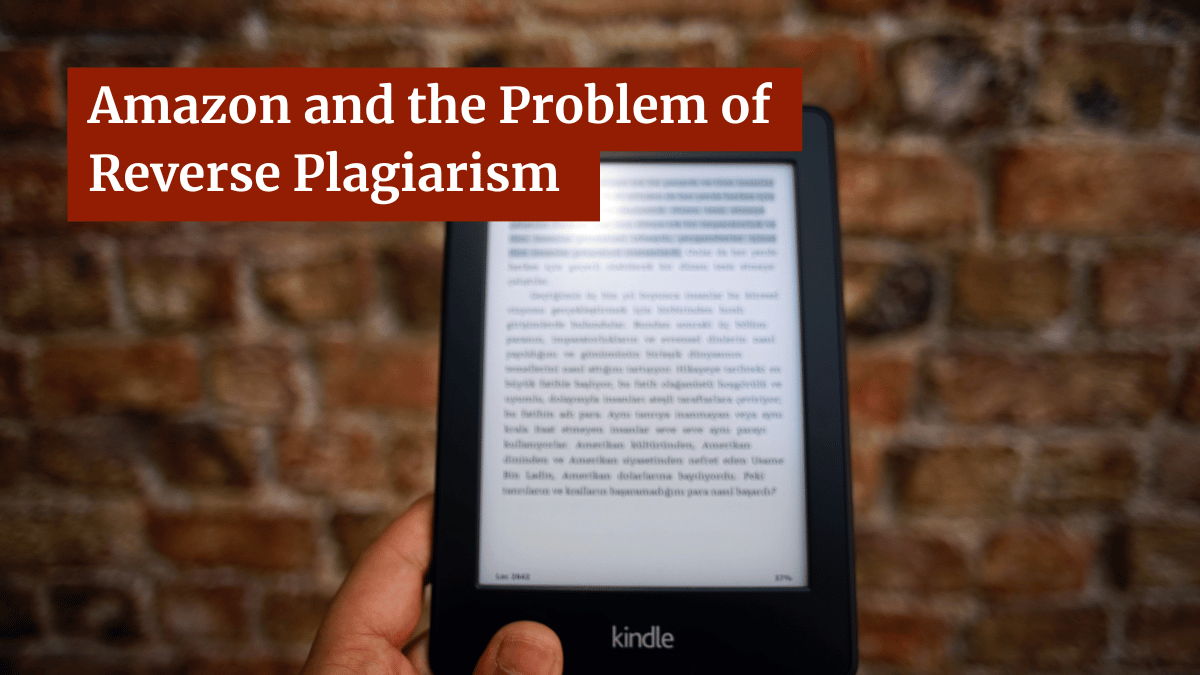Amazon and the Problem of Reverse Plagiarism

Authors, typically, have had two separate but related problems to worry about.
The first has been piracy, where their books are unlawfully traded on various sites, often overshadowing and harming their ability to sell legitimate copies.
The second has been plagiarism, other authors using plots, concepts or even text from their work to write “new” works to sell as their own.
Though the two issues are different in many ways, both ultimately fall under the realm of copyright, as that is the legal tool used to resolve those kinds of misuse.
However, author Jane Friedman has discovered a new kind of issue, one that is likely to grow in the coming years.
In a post on her website, Friedman told the story about how she learned books were being uploaded under her name that she didn’t write.
According to Friedman, the books were being uploaded by someone who was using AI to generate the works and then putting them online using her name, likely in hopes of tricking others into purchasing them by making them think that they are new works by her.
Fortunately, the scam didn’t seem to work in this case. The works have been removed, and, judging from the lack of reviews, it’s unlikely that many, if any, were fooled.
That said, the road to that resolution paints a grim picture about the future of publishing, especially for smaller authors who are trying to find an audience.
A Story of Reverse Plagiarism
Friedman is an author who has been writing about the publishing industry since at least 2009 when she began her blog. According to her site, she’s written or contributed to at least 10 different books, most of them about the publishing industry.
She first became aware of the issue when she noticed new books that she had not written appearing both on her official Goodreads profile and on Amazon. On her site, she shared two example images, seen below:


Though Friedman couldn’t say definitely that the books were generated by AI, she said that the text from the books were similar to responses to prompts she had generated using AI while doing vanity checks.
However, as she noted, there was an immediate problem. Where getting a pirated or plagiarized book removed is, in general, pretty easy to do with a copyright notice, these books were “original” from a legal standpoint and the only thing that they copied was her name.
Fortunately for Friedman, her online presence was such that, shortly after her post went live, Goodreads removed the fake titles from her profile. However, when she approached Amazon about the issue, they asked to see a trademark registration on her name and, when she said she didn’t have a registration, they closed the case with no action taken.
That changed the next day when Friedman said that the books had been removed. Though no reason was given, Friedman attributed it to her presence in the publishing community and, possibly, due to assistance from the Authors Guild, which she is a member of.
However, as Friedman notes, this raises a difficult question: How would other authors who aren’t in the Authors Guild or don’t have this large of a presence resolve these issues?
The Crux of the Problem
Friedman is clearly well-versed in IP issues as they impact the publishing industry, and immediately identifies the problem when it comes to combatting this kind of content.
Unless the books copied text or other protectable elements from Friedman’s work, copyright doesn’t apply to these cases. Even though these books are likely AI-generated works based on Friedman’s earlier content, they likely don’t have anything specific that would sustain a copyright infringement claim.
While the scammers did use her name, she once again correctly pointed out that there are likely hundreds of other potential authors with an equal right to use that name. Though there may be related issues, such as right of publicity, that right is not a nationwide one, and laws vary wildly from state to state. There’s also no simple way to enforce it on Amazon or Goodreads.
To make matters worse, this problem is likely to grow. As scammy “authors” turn to text generation to quickly churn out books, one of the obvious ways to make their books stand out is to connect them with an established author or celebrity. Even if that connection is only alluded to, it can be an easy, if dishonest, way to boost sales.
That, in turn, is why I refer to this as reverse plagiarism. Rather than taking someone else’s work and claiming it as their own, they’re taking work they generated and claiming it to be written by someone else.
The system we have isn’t set up to fight that, even as a tidal wave of it is likely on the horizon.
Fixing the Issue
Without some drastic changes, no easy fix to this is coming from the legal side. At least not in the United States.
However, the publishing industry right now is dominated by one single juggernaut: Amazon
Amazon is the largest bookseller in the world, through its Kindle Direct Publishing program it is the largest self-publisher (and the most likely source of AI-generated books) and through Goodreads, which it owns, it controls the largest social and review platform for books, authors and readers.
In short, if you want to run this kind of scam, it pretty much has to go through Amazon. That means, in theory, Amazon could stop or at least severely limit any such efforts single-handedly.
One good step would be to allow authors (or their agents) to control their profiles on both platforms. This would prevent what happened to Friedman, where books were added to her profile without permission. While many authors would not be able to participate in this, such as retired or deceased authors, it would at least help protect active ones from this fraud.
Another would be to provide a simple way for established authors to claim that someone is impersonating them. Those accused of impersonation should have an equally simple way to prove their authenticity if needed.
While this could be a challenge for pseudonymous works, there are definitely ways to set up processes for those as well.
However, this is where we run into the biggest problem: Amazon.
Amazon, despite being the juggernaut in this space, has shown time and time again that it will not take simple actions to reduce plagiarism, copyright infringement or other issues. Even as those issues harm authors, customers and their own reputation.
In 2009, the company recklessly launched a project to turn blogs into books that provided no checks the submitter held the rights. Then, in 2012, the company was racked by a scandal over widespread plagiarism in erotica. After that, in 2015, a journalist at The Hustle, proved it was possible to publish a plagiarized book and make it a bestseller. And then, in 2019, we looked at how Amazon could quickly and easily reduce its plagiarism problem but is failing to do so.
Sadly, things didn’t change after that. In early 2020 the company was called out for publishing plagairized books about the Coronavirus pandemic. And then there was another plagiarism scandal in 2022 involving Pagan authors.
The worst part is that Amazon has shown it is capable of taking action when motivated. In March of this year, we saw how the company was punishing authors when for “breaching exclusivity” when their works appeared on pirate sites outside their control.
In short, Amazon will go to incredible lengths to protect their interests but has shown time and again that they won’t take even basic steps to protect authors or readers.
That makes the future prospects in this space, bleak, especially for authors without the voice or the connections that Friedman has.
Bottom Line
To be clear, it is great that the Authors Guild is stepping up here, and the organization is definitely one worth joining if you are an author. The dues are reasonable, and the organization does do a lot of great work representing authors.
Likewise, it is also great that Amazon did the right thing. They removed the books in question both from Goodreads and their site. It was clearly the right thing to do.
However, this is a problem that is bigger than this incident. As generative writing proliferates, we’re likely to see many more stories like this one, involving smaller authors, as well as creators who aren’t published at all. This could include YouTubers, musicians, filmmakers and others who could generate a lot of interest with a book, but haven’t published one yet.
There needs to be an industry-wide push to ensure the integrity of authorship, and Amazon is by far the company best poised to take the lead on that. However, over the past fifteen years, they’ve repeatedly made it clear that’s a fight they’re not wanting to take on, even when dealing with much easier issues.
So that leaves us in a lurch. The tidal wave of generative writing is about to slam into this industry and the first line of defense has shown little interest in protecting authors.
While there’s always hope for change, Amazon’s pattern over the past decade plus has been very consistent in this space. As such, it is up to every author (and even many non-authors) to look out for their own name and their own work.
Which is a shame considering it doesn’t have to be that way.
Book Images Source: Jane Friedman’s Original Post
Want to Reuse or Republish this Content?
If you want to feature this article in your site, classroom or elsewhere, just let us know! We usually grant permission within 24 hours.
